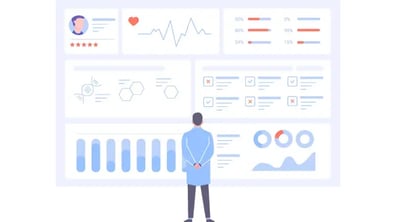What is a Clinical Data Manager?
A clinical data manager is a specialized professional responsible for overseeing the end-to-end data collection, cleaning, coding, and management process for clinical trials.
Clinical Data Managers are able to extract the most pertinent insights from your collected data, while safeguarding the quality, integrity, validity, and traceability of patient data generated during clinical studies.
What does a Clinical Data Manager do?
Clinical data managers have a diverse set of core responsibilities spanning the full data lifecycle:
- Facilitate a high-quality database and ensure EDC capabilities are maximized
- Designing case report forms (CRFs) and other data capture tools to standardize study data collection from sites
- Provide guidance within the eCRF to the investigative site staff on proper data collection to promote accuracy at point of data entry
- Establish validation checks for accurate data capture
- Receive and track data from other sources outside EDC (ePRO, eCOA, labs, etc.)
- Proactive review of site data on a real-time basis
- Clean and query identified data discrepancies, inconsistencies, and anomalies
- Track trial progress by reporting on enrollment status, data entry, and source document verification (SDV)
- Receipt and management of local laboratory normal ranges
- Ensure data cleanliness and facilitate database lock activities
- Archival of final study data and audit trails
-

Clinical Trials - Clinical Trial Strategy
Inside a CRO: The Pivotal Role of Clinical Trial Manager in Clinical Research
- |
What knowledge and technical skill does a Clinical Data Manager have?
To be effective, clinical data managers require specialized expertise including:
- In-depth knowledge of clinical research processes, guidelines and regulatory standards such as GCP
- Understanding of medical terminology, pharmacology, and drug development procedures
- Proficiency with CDISC (Clinical Data Interchange Standards Consortium) data standards like CDASH which enhance interoperability
- Working knowledge of clinical trial databases, EDC systems and eCRF design best practices
- Skills in using SAS or other statistical analysis software to develop custom programmed solutions
- Strong data reconciliation principles
- Deep understanding of data protection, privacy regulations and human subject protections
Guarding Data Quality and Compliance
Trustworthy, compliant data is the foundation for drawing insights from clinical trials. Clinical data managers are instrumental guardians responsible for:
- Continuous data review to identify errors, inconsistencies, discrepancies, anomalies etc.
- Issuing data queries to research sites to resolve identified data issues
- Executing rigorous quality control procedures throughout the data lifecycle
- Providing detailed audit trails and ensuring data traceability and reproducibility
- Safeguarding patient privacy and data confidentiality
Specialized Clinical Data Manager functions by research phase
While sharing common responsibilities, clinical data managers may specialize into certain functions by clinical phase:
- Phase I: Clinical Data Managers focus on collecting safety data and work closely with CRAs on reporting data trends and timely data entry to research sites during dose escalation. They implement rapid data cleaning and reporting to inform dosing decisions. Provide robust reporting to monitor trial progress in real time and facilitate strategic decision-making based on timely clinical trial results.
- Phase II: Clinical Data Managers refine data collection tools to ensure that data issues are identified early on and resolved quickly. They implement rigorous data quality control for these expanded trials.
- Phase III: Clinical Data Managers develop procedures for managing large volumes of data from multinational trials. They coordinate with Clinical Research Associates (CRAs) in various geographical locations and navigate global Protocol versions as applicable.
- Phase IV: Clinical Data Managers specialize in post-marketing safety surveillance studies and registries. They may utilize strategies in DB Design, including EHR integration, and targeted data review for broader patient populations over longer terms.
Clinical Data Managers – stewards of data in the era of analytics
For statistical analysis, regulatory submissions, and decision-making, clean and accurate clinical trial data is an absolute necessity. With rising data volumes and complexity, clinical data managers provide the oversight and solution driven considerations required in this big data era. They enable process automation and advanced analytics that generate treatment insights from trial data.
Conclusion
In summary, clinical data managers are the indispensable data stewards in clinical trials. Their specialized skills in designing data capture tools, implementing quality systems, and upholding compliance enable the generation of high-quality datasets. By managing end-to-end data workflows, clinical data managers ensure integrity and traceability – fueling modern evidence-based medicine. Their contributions provide reliable empirical foundations that advance patient treatments and health outcomes.



